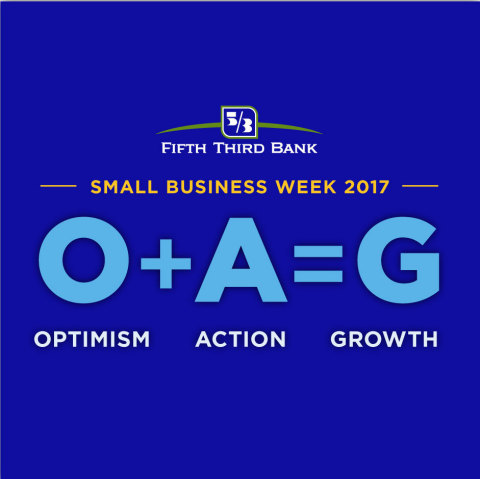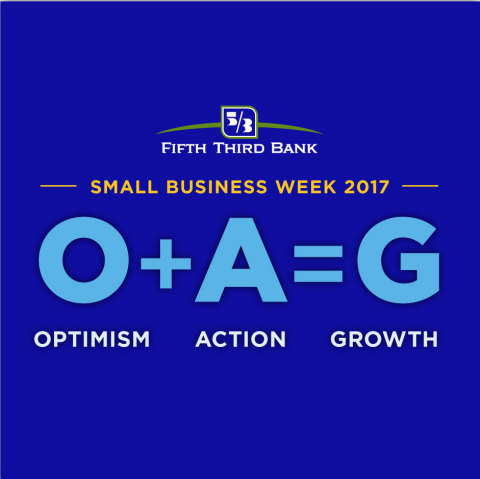CINCINNATI--(BUSINESS WIRE)--Nearly three out of five small business owners (58 percent) are more optimistic about their future as a direct result of the 2016 presidential election. This wave of optimism is tied to expectations that the new administration will enact widespread changes in business policy, regulations, taxation and healthcare costs.
In spite of this wave of optimism, barely over half (51 percent) of business owners say that they regularly follow and update a business plan. In addition, only 2 percent of small business owners most often turn to free or low cost solutions offered by the Small Business Administration, and just 4 percent will most often seek advice from their banker. They may be optimistic, but a survey commissioned by Fifth Third Bank (NASDAQ: FITB) shows that small business owners are leaving valuable resources on the table.
“We’re pleased with the positive outlook carried by many small business owners, but we also strongly encourage them to not rely on optimism alone to grow in 2017,” said Kala Gibson, head of Business Banking for Fifth Third Bank. “Small business owners must translate optimism into action if they want to achieve their business goals.”
The nationwide survey of small business owners uncovered small business owner sentiment, their expectations of a President Trump administration and what they plan to do with their business in the year following the election. Global research firm YouGov conducted the survey in the middle of the critical first 100-day period of the new administration.
O + A = G: Optimism Plus Action Equals Growth
When asked to identify the sources for their post-election optimism, small business owners pointed to four key areas where they expected positive changes to occur. They cited the potential for:
- More business-friendly policies (77%)
- Ease on business regulations (68%)
- Corporate tax cuts (60%)
- Lower healthcare costs (59%)
“It’s clear that small business owners have confidence that a more business-friendly climate is in our country’s future,” Gibson said. “But we believe that growth requires faith plus action. This Small Business Week, we encourage small business owners to take action by scheduling time to meet with their banker and utilize the many resources that are available to help plan and build for success.”
While the survey showed that small business owners are most often turning to peers, friends and family for support, they’re underutilizing lawyers, bankers and community assistance providers like the Small Business Administration’s Small Business Development Centers and Service Corps of Retired Executives (SCORE).
Making Growth a Reality
Overall, 90 percent of small business owners expect some level of revenue growth in the next 12 months, with 86 percent planning to take some action to make that growth a reality.
Largely, small business owners report planning similar tactics to grow their business to those reported in last year’s pre-election survey, including:
- Increasing online presence (31%)
- Targeting new geographic, demographic, and other markets (30%)
- Hiring new employees (29%)
- Offering new products and services (28%)
Obstacles to growth also were identified in the study. Thirty-two percent of small business owners reported lack of funds as an obstacle. Following closely behind, a market or product offering that was too niche was identified as an obstacle by 21 percent of respondents, and lack of non-monetary resources was an obstacle for 17 percent of those surveyed.
While lack of funds was identified by more small business owners as a growth obstacle than any other topic, 45 percent said they wouldn’t consider loans offered by the Small Business Administration for any reason.
“We’re pleased to see that small business owners are using time-tested methods to grow their business,” Gibson said. “But, whether you’re the owner of a micro-business with two employees, or a small business with revenue in the millions, you can employ strategies to make growth a reality that aren’t often considered, including a loan offered by the Small Business Administration.”
For its part, Fifth Third Bank is committed to the development of small businesses throughout the Bank’s footprint. The Bank has invested $7 million in a multi-year effort to support community resources that are vital partners in helping businesses grow. The Bank joins the rest of the nation as it recognizes the immense impact made every day by small business owners as part of National Small Business Week.
Survey Methodology
All figures, unless otherwise stated, are from YouGov Plc. Total sample size was 505 adults (aged 18+) working full time at private organizations with less than $10 million in revenue, as the head, owner, or CEO of their employer. Fieldwork was undertaken between 17th - 23rd March 2017. The survey was carried out online.
About Fifth Third
Fifth Third Bancorp is a diversified financial services company headquartered in Cincinnati, Ohio. As of March 31, 2017, the Company had $140 billion in assets and operated 1,155 full-service Banking Centers and 2,471 ATMs in Ohio, Kentucky, Indiana, Michigan, Illinois, Florida, Tennessee, West Virginia, Georgia and North Carolina. Fifth Third operates four main businesses: Commercial Banking, Branch Banking, Consumer Lending, and Wealth & Asset Management. As of March 31, 2017, Fifth Third also had a 17.8 percent interest in Vantiv Holding, LLC. Fifth Third is among the largest money managers in the Midwest and, as of March 31, 2017, had $323 billion in assets under care, of which it managed $33 billion for individuals, corporations and not-for-profit organizations through its Trust, Brokerage and Insurance businesses. Investor information and press releases can be viewed at www.53.com. Fifth Third’s common stock is traded on the Nasdaq® Global Select Market under the symbol “FITB.” Fifth Third Bank was established in 1858. Member FDIC, Equal Housing Lender.
Copyright © 2017 Fifth Third Bank, Member FDIC, Equal Housing Lender, All Rights Reserved.





